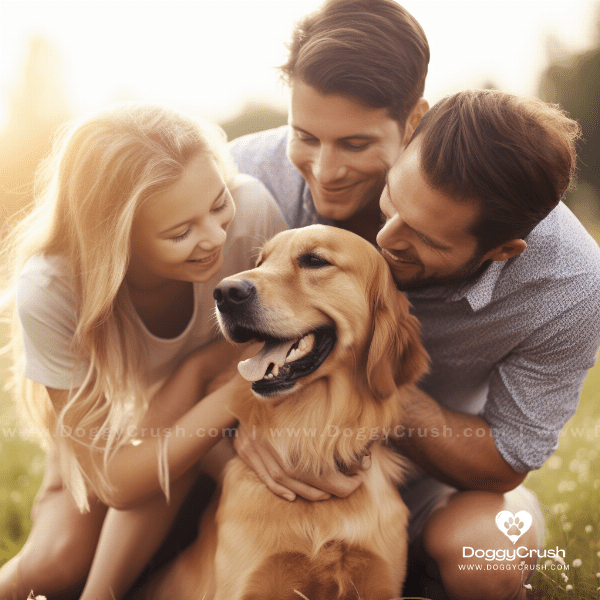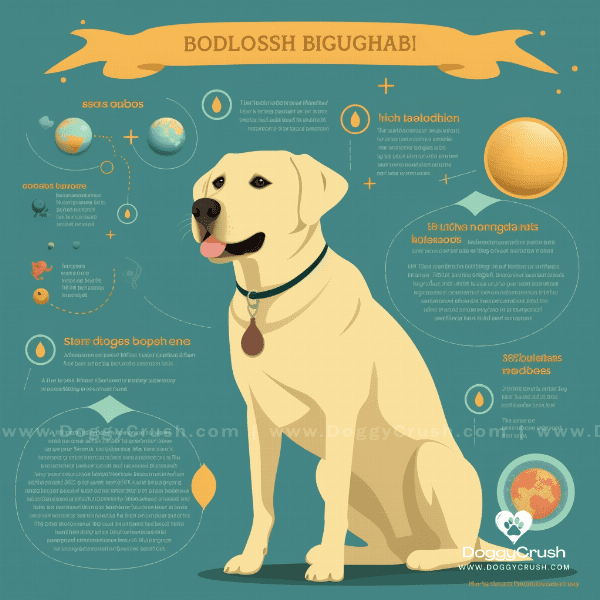Table of Contents
- History of Golden Retrievers: Where They Came From
- Characteristics of Golden Retrievers: What Makes Them Unique
- The Different Types of Golden Retrievers: English vs American
- How to Choose a Golden Retriever: Finding the Right Fit
- Taking Care of Your Golden Retriever: Grooming, Exercise, and Nutrition
- Training Your Golden Retriever: Tips and Techniques
- Common Health Concerns for Golden Retrievers: What to Look Out For
- Golden Retriever Rescue: Finding a Forever Home for a Rescued Dog
- Fun Activities to Do with Your Golden Retriever: Bonding and Playtime
- Conclusion: Why Golden Retrievers Make Great Family Pets
History of Golden Retrievers: Where They Came From
Golden Retrievers have a rich history that dates back to the 19th century. In the mid-1800s, a Scottish businessman named Sir Dudley Marjoribanks, also known as Lord Tweedmouth, began breeding dogs on his estate in Scotland. His goal was to create the ultimate hunting dog that would be able to retrieve game from both land and water.
The First Golden Retrievers
In 1865, Lord Tweedmouth purchased a yellow retriever named Nous and bred her with a wavy-coated retriever named Belle. This breeding resulted in four puppies, which were the foundation for the breed that we know today as Golden Retrievers. The puppies were named Ada, Crocus, Primrose, and Cowslip, and they all had yellow coats.
Further Development of the Breed
Over the next few years, Lord Tweedmouth continued to breed his dogs and experimented with different types of retrievers to create the ideal breed. He crossed his original dogs with Irish Setters, Bloodhounds, and more wavy-coated retrievers. As a result of these breedings, Golden Retrievers began to exhibit the traits that we recognize today, such as their friendly disposition and their ability to retrieve game.
Popularity of Golden Retrievers
Golden Retrievers quickly gained popularity in the United Kingdom as exceptional hunting dogs. Their ability to retrieve game from both land and water made them a favorite among hunters. Eventually, Golden Retrievers were introduced to North America and other parts of the world, where they became beloved family pets.
Today, Golden Retrievers are recognized as one of the most popular Dog breeds in the world. They are still used as hunting dogs, but they are also used as service dogs, therapy dogs, and loyal family companions. The history of the Golden Retriever is a testament to the power of selective breeding and the deep bond between humans and their furry friends.
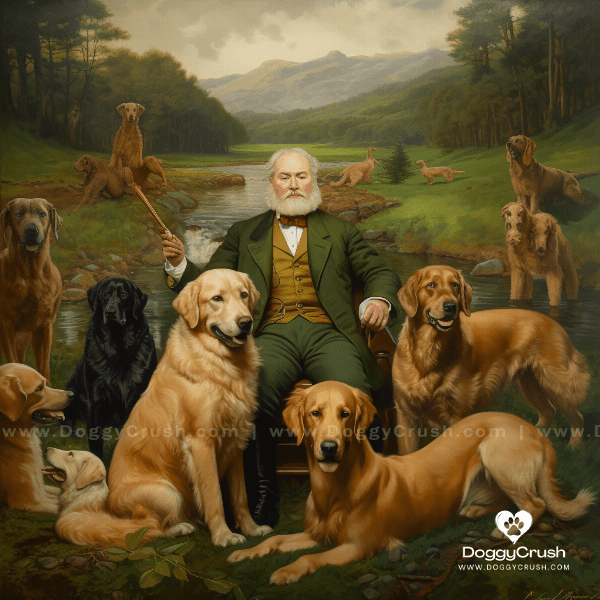
Characteristics of Golden Retrievers: What Makes Them Unique
Golden Retrievers are a breed that is known for their friendly and outgoing personality. They are also known for their intelligence, loyalty, and trainability. Here are some of the characteristics that make Golden Retrievers unique:
Appearance
Golden Retrievers are a medium to large-sized breed with a muscular build. They have a dense, water-repellent coat that ranges in color from light to dark golden. Their coats are thick and require regular grooming to prevent matting and tangling. Golden Retrievers have a broad head with friendly, dark eyes that convey their gentle nature.
Temperament
One of the most defining characteristics of Golden Retrievers is their temperament. They are known for being friendly and outgoing with both humans and other animals. They are social dogs that thrive on attention and love to be around their owners. Golden Retrievers are also intelligent and trainable, making them excellent service dogs, therapy dogs, and search and rescue dogs.
Energy Level
Golden Retrievers are a high-energy breed that require daily exercise and mental stimulation. They love to run, play, and swim, and they are happiest when they are active. Golden Retrievers are also known for their love of retrieving, which makes games of fetch a favorite pastime.
Health
Golden Retrievers are generally a healthy breed, but they are prone to certain health issues, such as hip and elbow dysplasia, eye problems, and cancer. Regular check-ups with a veterinarian can help catch any health issues early, and a healthy diet and exercise routine can help prevent some of these health issues.
Golden Retrievers are a special breed that captures the hearts of their owners with their loving and loyal nature. Their unique characteristics make them a favorite among families, hunters, and those in need of a helping paw.

The Different Types of Golden Retrievers: English vs American
While Golden Retrievers are a single breed, there are two distinct types of Golden Retrievers: English and American. These two types have some subtle differences that set them apart.
English Golden Retrievers
English Golden Retrievers, also known as British Golden Retrievers, have a broader head, shorter muzzle, and darker eyes than American Golden Retrievers. They also tend to have a thicker coat that is a lighter shade of golden. English Golden Retrievers are known for their calm and laid-back personality, making them a favorite among families.
American Golden Retrievers
American Golden Retrievers, on the other hand, have a more slender build, longer muzzle, and lighter-colored eyes. Their coat is usually a lighter shade of golden, and they may have feathering on their legs and tail. American Golden Retrievers are known for their high energy and playful personalities, making them popular among active families.
Differences in Purpose
The differences in appearance between English and American Golden Retrievers are largely due to differences in their purpose. English Golden Retrievers were originally bred as hunting dogs, while American Golden Retrievers were bred for conformation shows. As a result, English Golden Retrievers tend to have a stockier build and a thicker coat to protect them from the cold water while retrieving game. American Golden Retrievers, on the other hand, were bred for their beauty and grace in the show ring.
Choosing the Right Type of Golden Retriever
When choosing a Golden Retriever, it’s important to consider which type would best fit your lifestyle and needs. If you’re looking for a calmer, more laid-back dog, an English Golden Retriever may be the right choice for you. If you’re looking for a more active, playful dog, an American Golden Retriever may be a better fit. Regardless of which type of Golden Retriever you choose, you can be sure that you’ll have a loyal and loving companion by your side.
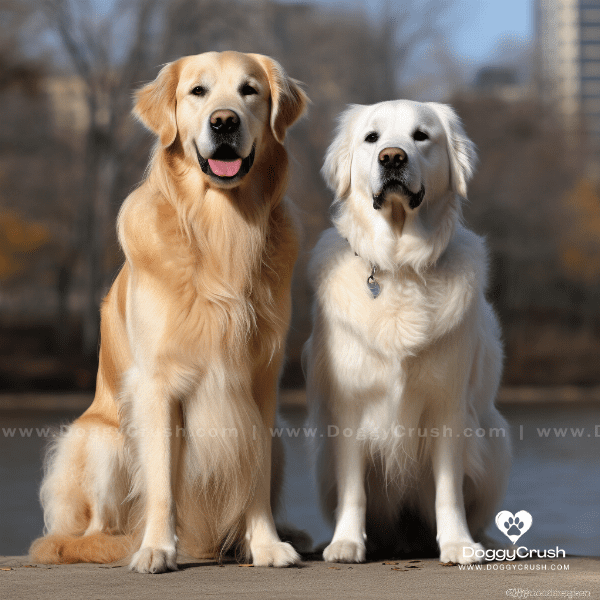
How to Choose a Golden Retriever: Finding the Right Fit
Choosing a Golden Retriever is an exciting decision, but it’s important to take some time to consider what you’re looking for in a dog. Here are some factors to consider when choosing a Golden Retriever:
Lifestyle and Activity Level
Golden Retrievers are a high-energy breed that require daily exercise and mental stimulation. It’s important to consider your lifestyle and activity level when choosing a Golden Retriever. If you’re an active person who enjoys hiking and outdoor activities, an American Golden Retriever may be a better fit. If you’re looking for a calmer dog that is happy to snuggle on the couch, an English Golden Retriever may be a better fit.
Size and Living Space
Golden Retrievers are a medium to large-sized breed that require ample living space. If you live in an apartment or have limited space, a Golden Retriever may not be the best fit for you. It’s important to consider the size of your living space and whether you have a yard for your dog to play in.
Breeder and Health
When choosing a Golden Retriever, it’s important to find a reputable breeder who conducts health screenings on their dogs. Golden Retrievers are prone to certain health issues, such as hip and elbow dysplasia, eye problems, and cancer. A responsible breeder will conduct health screenings on their dogs and provide documentation to prospective owners.
Temperament and Personality
Golden Retrievers are known for their friendly and outgoing personalities, but individual dogs may have different temperaments. It’s important to meet the dog’s parents and spend time with the puppy before making a decision. This will give you a sense of the dog’s temperament and whether it will be a good fit for your family.
Choosing a Golden Retriever is a big decision, but with some careful consideration and research, you can find the right fit for your lifestyle and needs. A Golden Retriever can be a loyal and loving companion for many years to come.
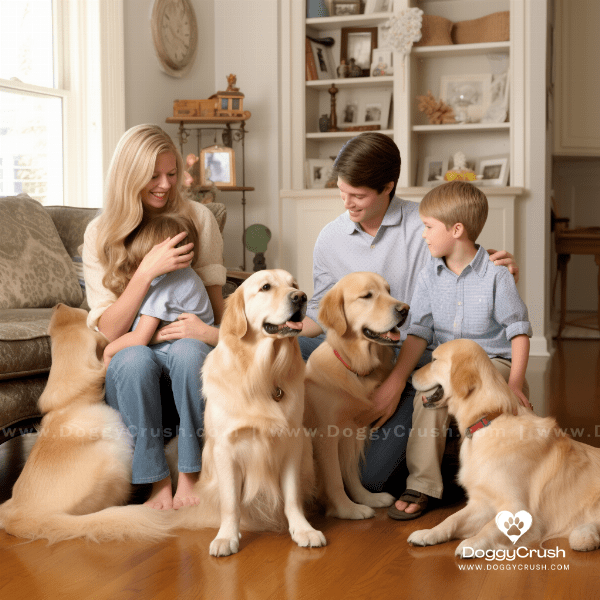
Taking Care of Your Golden Retriever: Grooming, Exercise, and Nutrition
Taking care of your Golden Retriever is essential for their health and happiness. Here are some tips for grooming, exercise, and nutrition to keep your Golden Retriever healthy and happy:
Grooming
Golden Retrievers have a thick, water-repellent coat that requires regular grooming to prevent matting and tangling. Brushing your Golden Retriever’s coat a few times a week will help to remove loose fur and prevent matting. Bathing your dog once a month with a gentle dog shampoo will also help to keep their coat clean and healthy.
It’s also important to maintain your Golden Retriever’s dental hygiene. Brushing your dog’s teeth regularly and providing dental chews or toys can help to prevent dental problems down the line.
Exercise
Golden Retrievers are a high-energy breed that require daily exercise and mental stimulation. They love to run, play, and swim, so regular walks, trips to the park, and swimming sessions are all great ways to keep your Golden Retriever active and engaged. Games of fetch and puzzle toys can also provide mental stimulation and help prevent boredom.
Nutrition
A healthy diet is essential for your Golden Retriever’s health and longevity. A high-quality dog food that is specifically formulated for your dog’s age and activity level is important. Be sure to feed your dog the appropriate amount of food, as overfeeding can lead to obesity and health problems.
It’s also important to provide your Golden Retriever with fresh water at all times. Make sure to clean your dog’s water bowl regularly to prevent the buildup of bacteria.
Regular Vet Visits
Regular visits to the veterinarian are essential for your Golden Retriever’s health. Your veterinarian can provide routine vaccinations and checkups, as well as catch any health issues early. They can also provide advice on nutrition, exercise, and other aspects of your dog’s care.
Taking care of your Golden Retriever requires commitment and dedication, but the rewards of a happy and healthy dog are well worth the effort. By providing proper grooming, exercise, nutrition, and veterinary care, you can ensure that your Golden Retriever will live a long and happy life.

Training Your Golden Retriever: Tips and Techniques
Training your Golden Retriever is an essential part of their care and can help to prevent behavioral problems down the line. Here are some tips and techniques for training your Golden Retriever:
Start Early
It’s important to start training your Golden Retriever early, ideally when they are a puppy. Puppies have a short attention span, so training sessions should be kept short and positive. Consistency is key, and it’s important to reinforce positive behaviors with treats, praise, and play.
Positive Reinforcement
Positive reinforcement is one of the most effective training techniques for Golden Retrievers. Rewarding your dog for positive behavior, such as sitting or coming when called, will help to reinforce these behaviors. Treats, praise, and play are all great ways to reward your dog.
Socialization
Socialization is an important aspect of training your Golden Retriever. Early socialization with other dogs and people can help to prevent fear and aggression down the line. Exposing your dog to new experiences and environments can also help to build their confidence.
Consistency
Consistency is key when training your Golden Retriever. Using consistent commands and training techniques will help to reinforce positive behaviors. It’s also important to set clear boundaries and rules for your dog, and to enforce them consistently.
Patience and Persistence
Training your Golden Retriever requires patience and persistence. It’s important to understand that your dog will not learn everything overnight, and that some behaviors may take longer to train than others. Consistent training and positive reinforcement will eventually lead to success.
Training your Golden Retriever can be a rewarding and fulfilling experience for both you and your dog. With patience, persistence, and positive reinforcement, you can train your Golden Retriever to be a well-behaved and obedient companion.

Common Health Concerns for Golden Retrievers: What to Look Out For
Golden Retrievers are generally a healthy breed, but they are prone to certain health issues. Here are some common health concerns for Golden Retrievers and what to look out for:
Hip and Elbow Dysplasia
Hip and elbow dysplasia are conditions where the joints do not develop properly, leading to pain and discomfort for the dog. Signs of hip or elbow dysplasia may include lameness, difficulty getting up or down, and reluctance to exercise. Regular check-ups with a veterinarian can help to catch these conditions early, and surgical options are available in severe cases.
Eye Problems
Golden Retrievers are prone to certain eye problems, such as cataracts and progressive retinal atrophy (PRA). Signs of these conditions may include cloudiness in the eyes, reluctance to go outside in bright light, and vision loss. Regular eye exams with a veterinarian can help to catch these conditions early and prevent vision loss.
Cancer
Unfortunately, Golden Retrievers are prone to certain types of cancer, such as lymphoma and hemangiosarcoma. Signs of cancer may include weight loss, lethargy, and abnormal lumps or bumps on the body. Early detection and treatment are essential in the fight against cancer.
Ear Infections
Golden Retrievers are prone to ear infections due to their floppy ears and a tendency to swim. Signs of an ear infection may include itching, redness, and discharge from the ear. Regular cleaning and drying of the ears can help to prevent infections.
Obesity
Golden Retrievers are prone to obesity, which can lead to a host of health issues such as joint problems and diabetes. It’s important to monitor your dog’s weight and to provide regular exercise and a healthy diet.
Regular check-ups with a veterinarian and awareness of common health concerns can help to keep your Golden Retriever healthy and happy. By providing proper care, exercise, nutrition, and veterinary care, you can help to prevent health issues and ensure a long and happy life for your Golden Retriever.

Golden Retriever Rescue: Finding a Forever Home for a Rescued Dog
Golden Retrievers are a popular breed, but unfortunately, not all of them find forever homes. If you’re considering adopting a Golden Retriever from a rescue, here are some things to keep in mind:
Benefits of Rescue Adoption
Adopting a Golden Retriever from a rescue has many benefits. You’ll be giving a dog a second chance at a happy life, and you’ll be providing a loving home for a dog in need. Many rescue dogs come from difficult backgrounds, such as neglect or abandonment, and they may require extra patience and care. But with dedication and love, rescue dogs can make wonderful companions.
Finding a Reputable Rescue
When looking for a Golden Retriever rescue, it’s important to do your research and find a reputable organization. Look for a rescue that conducts health screenings on their dogs and provides thorough evaluations of their temperament and behavior. A good rescue will also provide support and resources for adopters, such as training and behavior advice.
Preparing for Adoption
Before adopting a Golden Retriever from a rescue, it’s important to prepare your home and family. Golden Retrievers require ample space and regular exercise, so make sure that you have a yard or access to a park for your dog to play in. It’s also important to consider your family’s schedule and lifestyle, as rescue dogs may require extra attention and care.
Introducing Your New Dog
Introducing a rescue dog to your home and family requires patience and care. It’s important to introduce your new dog to your home gradually and provide plenty of positive reinforcement. Training and socialization can also help to build a bond between you and your new dog.
Providing a Loving Home
Providing a loving home for a rescue Golden Retriever requires dedication and patience. Your new dog may have some behavioral or health issues that require extra care and attention. But with love and care, your rescue dog can thrive and become a beloved member of your family.
Adopting a Golden Retriever from a rescue is a rewarding and fulfilling experience. By providing a loving home for a dog in need, you’ll be making a difference in their life and yours.
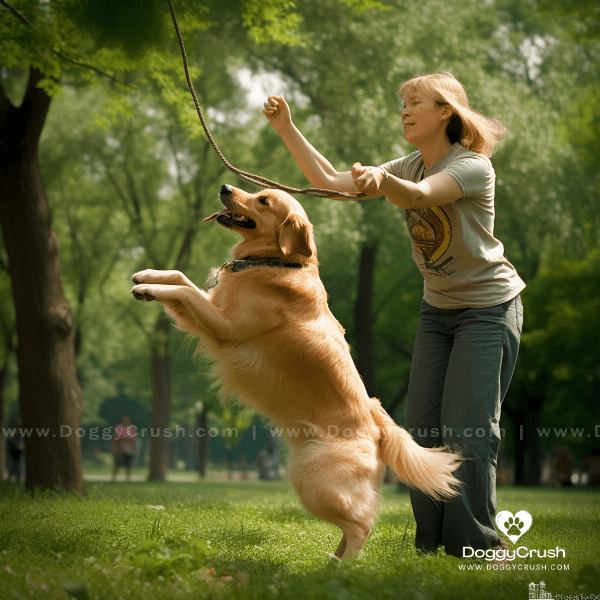
Fun Activities to Do with Your Golden Retriever: Bonding and Playtime
Golden Retrievers are a high-energy breed that love to play and bond with their owners. Here are some fun activities to do with your Golden Retriever:
Play Fetch
Playing fetch is a classic activity that many Golden Retrievers love. Throw a ball or Frisbee and watch your dog fetch it and bring it back to you. This is a great way to provide exercise and mental stimulation for your dog.
Go Swimming
Golden Retrievers are natural swimmers and love to play in the water. Take your dog to a nearby lake or river and let them swim and splash to their heart’s content. This is a great way to provide exercise and keep your dog cool on hot days.
Play Tug-of-War
Playing tug-of-war can be a fun bonding activity for you and your Golden Retriever. Make sure to use a sturdy toy and teach your dog to release the toy on command to prevent any accidental bites or injuries.
Go for a Hike
Golden Retrievers love to explore and sniff out new scents. Take your dog on a hike and let them explore the great outdoors. This is a great way to provide exercise and mental stimulation for your dog, while also enjoying nature.
Enroll in Agility Training
Agility training is a fun way to provide exercise and mental stimulation for your Golden Retriever. Enroll in a local agility class and teach your dog to navigate obstacles such as tunnels, jumps, and weave poles. This is a great way to strengthen your bond with your dog and teach them new skills.
Attend a Dog Park
Dog parks are a great way to socialize your Golden Retriever and provide exercise and playtime. Make sure to supervise your dog and follow any rules or guidelines set by the park.
By engaging in fun activities with your Golden Retriever, you can strengthen your bond and provide exercise and mental stimulation for your dog. Make sure to tailor activities to your dog’s age, ability level, and interests. With love and play, your Golden Retriever will be a happy and fulfilled companion.
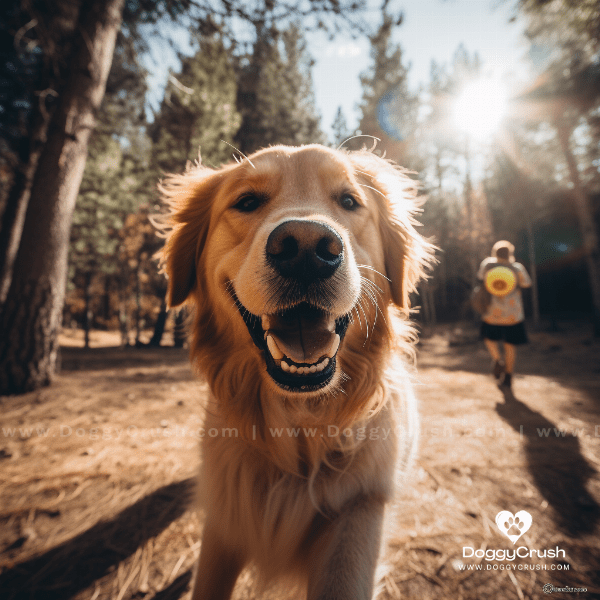
Conclusion: Why Golden Retrievers Make Great Family Pets
Golden Retrievers are a popular breed for good reason. They are friendly, loyal, and make great family pets. Here are some reasons why Golden Retrievers make wonderful companions:
Friendly and Social
Golden Retrievers are known for their friendly and social personalities. They love to be around people and other dogs and thrive on attention and affection. They are great with children and make wonderful family pets.
High Energy and Playful
Golden Retrievers are a high-energy breed that love to play and engage in physical activity. They are great companions for active families and love to participate in outdoor activities such as hiking and swimming.
Intelligent and Easy to Train
Golden Retrievers are highly intelligent and eager to please, making them easy to train. They excel in obedience and agility training and love to learn new skills.
Affectionate and Loving
Golden Retrievers are known for their affectionate and loving personalities. They bond closely with their owners and make great companions for those seeking a loyal and loving pet.
Versatile and Adaptable
Golden Retrievers are a versatile breed that can adapt to many different living situations. They are great for families with children, but also make wonderful companions for singles or seniors.
In conclusion, Golden Retrievers make great family pets due to their friendly and social personalities, high energy and playfulness, intelligence and trainability, affectionate and loving nature, and versatility and adaptability. By providing proper care, exercise, nutrition, and veterinary care, you can ensure that your Golden Retriever will live a long and happy life as a beloved member of your family.
